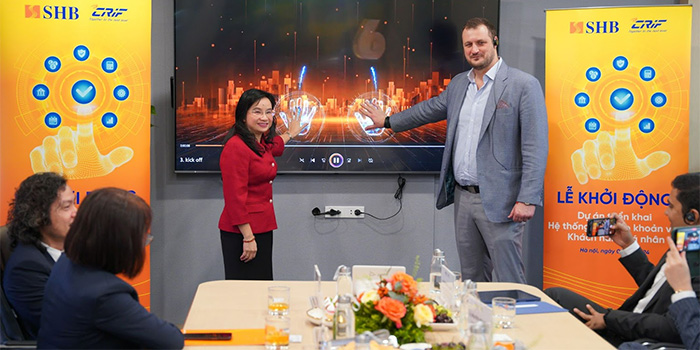The Industrial Revolution 4.0 and digital transformation
have become mandatory requirements and strategic
imperatives across all sectors, especially in the banking
industry. Over the past few years, the world has
witnessed the rapid expansion and growth of digital
banking trends. The outbreak of the Covid-19 pandemic
in early 2020 further underscored the critical need for
digital solutions in banking, making their adoption more
essential than ever.
In 2023, SHB dedicated substantial resources to launch
its latest Omnichannel platform - SHB SAHA to optimize
seamless customer experiences across all channels,
spanning from the Mobile App to Internet Banking and
in-person transactions. It boasts comprehensive utilities,
stable operations, secure transactions, and integrates
an intuitive design.
SHB has recently introduced payment features on its
digital platforms for Corporate Banking. As a result,
transaction rates have significantly increased from
26% to 46% compared to the same period last year.
The number of corporate customers utilizing e-banking
services has also surged, growing from nearly 2,800
to over 15,000. These improvements are attributed to
enhanced user experiences, reduced transaction times,
and the convenience of online cash management.
Notable enhancements include online pre-approved
overdrafts, Slink virtual accounts and automated debits
for medical and tuition fees.
The user-friendly features of both the old and new
applications have resulted in business units saving time
equivalent to the workload of more than 293 employees
across Retail Banking and Corporate Banking Divisions.
Through the Omnichannel project for Retail Banking,
a multitude of features have been developed across
all three channels of SHB SAHA - Mobile Apps, Online
Banking, and Branches - within a mere 16 months (from
September 2022 to December 2023). Simultaneously,
the migration of customers to the new application has
been underway, with continuous testing and upgrades
of features and performance to ensure stability and
smoothness. The ultimate goal is to migrate all customers
to the new application by 2024.
Building on the Digital Transformation initiatives already
in motion, SHB will further advance its offerings on
e-Banking in 2024, extending beyond retail customers
to include corporate clientele. For Retail Banking, SHB
pledges to deliver “Peace of mind in every transaction”
through the Omni Channel, boasting comprehensive
utilities and prioritizing top-notch security. As for
Corporate Banking, 2024 marks a year of expansion in
customer base, transaction volume, and transaction
value to enhance user experience on the digital platform.
Additionally, SHB plans to upgrade the e-Banking
system for Corporate Banking to accommodate even
more remarkable growth in the future.
SHB pledges to deliver “Peace of mind in every
transaction” through the Omni Channel, boasting
comprehensive utilities and prioritizing top-notch
security.








